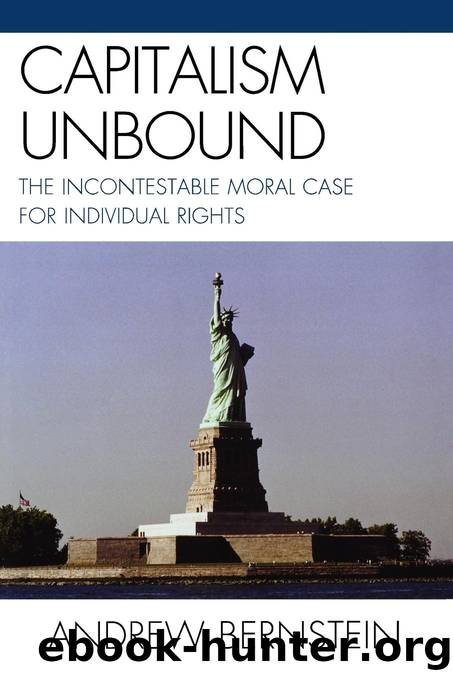Capitalism Unbound by Bernstein Andrew;

Author:Bernstein, Andrew;
Language: eng
Format: epub
Publisher: UPA
Published: 2010-08-15T00:00:00+00:00
Chapter Five
The Virtue of Selfishness
Selfishness, according to conventional wisdom, is synonymous with using, abusing, and misusing innocent others in order to satisfy oneâs own goals or desires. The dictionary defines âselfishâ as: âbeing concerned primarily with oneâs own interests, benefits, welfare, etc., regardless of others.â
Note that the commonly held view construes a manâs self-interest as either holding no regard for othersâat bestâor in abusing and victimizing themâat worst. This, as every other point of the conventional moral understanding, must be challenged.
Mere minutes of careful thought are sufficient to refute such a belief. For example, it is very much to an individualâs long-term, rational self-interest to have close friends, an intimate romantic relationship, amicable, respectful dealings with neighbors, acquaintances, and colleagues, because these bring into his life affection, closeness, camaraderie, love, and serenity of spiritâpriceless possessions for a human being. Is a manâs life and level of happiness more fulfilledâor lessâbecause of such intimacy? The overwhelming preponderance of human beings understandably answer: more so.
A further question can be raised: are such positive, happiness-generating relationships advanced by honesty or by dishonestyâby morally upright dealings or by immoral connivingâby respecting the rights of other men or by flouting them? Clearly, by honest, respectful dealings with others.
If a man lies, cheats, and/or steals, he risks apprehensionâand fills his life with chronic trepidation regarding the outcome of such vile activity. He makes of mankindâs noblest membersâthose scrupulously honestâhis enemies; and of their most life-supporting characteristicâdiscerning intelligenceâhis gravest threat. But if, on the other hand, he works hard, honestly, and to optimal capacity, he earns more than a cheater could ever duplicitously gain, fills his inner life with pride and tranquility, and attracts, as by gravitational tug, persons who venerate a manâs supremely priceless possession: strength of character.
Further, when unfailingly respectful toward others, a man stands on un-shakeable moral foundations in expecting an identical respect from them. By contrast, if he callously exploits them, upon what moral principle will he stand in demanding justice toward himself?
Such points are readily explainable to elementary school childrenâhow then, do moralists so often miss them? Why does the conventional code blandly, as if upholding an inarguably exact moral axiom, support the pre-posterous notion that true selfishnessâhappiness-invoking, genuinely selfish behaviorâentails the victimization of others?
This is a profoundly important questionâand its answer penetrates to the core of moral philosophy. A first part of an answer is to explain what an authentic egoism or selfishness properly entailsâwhat it is and what, in action, it looks like.
In the authorâs judgment, Ayn Rand has revolutionized mankindâs understanding of moral philosophy and is so far ahead of her time that only today, 53 years after the publication of her magnum opus, Atlas Shrugged, are professional philosophers finally beginning to seriously study her theories.
Download
This site does not store any files on its server. We only index and link to content provided by other sites. Please contact the content providers to delete copyright contents if any and email us, we'll remove relevant links or contents immediately.
International Integration of the Brazilian Economy by Elias C. Grivoyannis(57391)
The Radium Girls by Kate Moore(10916)
Turbulence by E. J. Noyes(7057)
Nudge - Improving Decisions about Health, Wealth, and Happiness by Thaler Sunstein(6643)
The Black Swan by Nassim Nicholas Taleb(6204)
Pioneering Portfolio Management by David F. Swensen(5616)
Rich Dad Poor Dad by Robert T. Kiyosaki(5163)
Zero to One by Peter Thiel(4834)
Man-made Catastrophes and Risk Information Concealment by Dmitry Chernov & Didier Sornette(4749)
Secrecy World by Jake Bernstein(3788)
Millionaire: The Philanderer, Gambler, and Duelist Who Invented Modern Finance by Janet Gleeson(3576)
Skin in the Game by Nassim Nicholas Taleb(3479)
The Age of Surveillance Capitalism by Shoshana Zuboff(3432)
The Money Culture by Michael Lewis(3291)
Skin in the Game: Hidden Asymmetries in Daily Life by Nassim Nicholas Taleb(3273)
Bullshit Jobs by David Graeber(3190)
The Dhandho Investor by Mohnish Pabrai(3176)
The Wisdom of Finance by Mihir Desai(3087)
Blockchain Basics by Daniel Drescher(2896)
